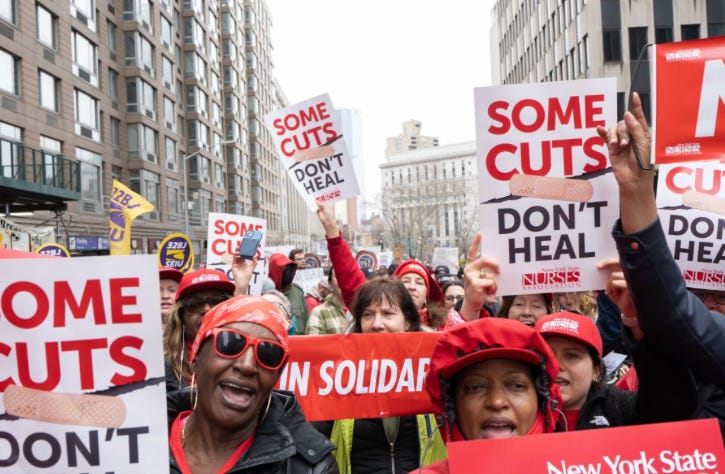the medicaid 'cuts' that aren't
and the failures of universal healthcare
Last week, Americans took to the streets to protest a lot of things. I respect a (peaceful) protest. Your voice is your power. Love that.
And one of the things many Americans are clearly upset about is Republicans’ proposed Medicaid “cuts.” I honestly didn’t know much about the bill, so I assumed the mainstream messaging—that Republicans wanted to save money and cut people from government-funded healthcare—was largely correct. Especially after seeing just how many people and politicians (not just liberal ones) were passionate about the issue.
Then yesterday, I read a clickbait-y analysis estimating that the “cuts” would lead to thousands of American deaths. There were a lot of statistical cartwheels the authors had to go through to make this judgment. And honestly, after viewing the lead author’s X feed (big #FreePalestine guy, doesn’t love the administration’s deportations), it’s hard to take the paper as a pure, apolitical analysis.
It prompted me to figure out what exactly is going down on Capitol Hill.
Here are some facts from Chris Jacobs, a veteran healthcare researcher and writer:
“The policies being envisioned would not cut Medicaid, but rather slow the growth of a program that has exploded beyond recognition over the last several years…
Even if the House Energy and Commerce Committee generates its entire $880 billion in directed deficit reduction from within Medicaid, the program will still grow by more than $1 trillion over the coming decade. If that constitutes a ‘cut,’ I’d hate to see what ‘growth’ means.”
And another take, from the Center for Renewing America’s Samara Brown:
“Not only will the savings proposals discussed here not ‘cut’ the program; in many instances, they’ll simply undo changes finalized by the Biden administration less than a year ago.
At a time when the federal debt continues to climb, the idea of returning Medicaid spending to levels from just a few years ago has the same logic as returning federal spending to pre-COVID levels. It looks radical only in Washington.”
I highly recommend reading both David and Samara’s detailed reviews of what’s going down. But just so we’re clear: the proposed bill does not cut anyone currently on Medicaid. It simply returns eligibility requirements to pre-Covid standards.
It introduces more checks and balances at the state level, aims to mitigate fraud, requires able-bodied adults to work or volunteer at least 80 hours per month, bans dual eligibility for Medicaid and Medicare, prohibits state-sponsored gender-affirming care, and pulls funding for undocumented immigrants.
On the last point regarding undocumented immigrants: would you expect or demand free healthcare if you’re an American citizen living in Switzerland or Japan? Especially if you’re there in violation of the country’s immigration laws?
Just some questions to consider.
Universal Healthcare…
When we hear passionate voices proclaim that universal healthcare is a “human right,” it’s important to pause and consider the reality. In an ideal world, everyone would have access to world-class care at little or no cost. But so far, no country has exactly nailed the socialized healthcare situation.
Take Canada, for example, where the state has progressively interjected itself between patient and physician. Basic care has steadily declined, with the median wait time for treatment now hitting 30 weeks, the longest ever recorded.
“It’s not just the delays for surgeries and diagnostics that are putting Canadians at risk,” warns Dr. Merrilee Fullerton, a Canadian physician and politician.
“Millions of Canadians are without a family doctor. Recently, hundreds lined up in a small Ontario town, braving the winter cold, hoping to sign up for one. Only the first 500 were accepted.”
Similar stats and stories are reported from the Western European countries where healthcare is socialized.
I’ll be the first to criticize the American healthcare system, as I do on an almost daily basis. Of course I want it to be more affordable, and I hate, hate, hate that the system—insurance companies, hospitals, pharmaceutical companies—is set up to profit from prolonging sickness.
But I hesitate anytime we’re acquiescing privatization for state solutions. In theory, it looks great. In practice, it results in bad healthcare.
Where I want to see lawmakers pour more time and attention is into reversing the chronic disease epidemic that’s come out of nowhere. But alas, both sides of the political aisle are owned by the system. A guy can dream.
This sounds so pessimistic. Nihilistic, even. But I think the sooner we realize that Capitol Hill and the industry don’t care about our health, the sooner we’ll take it into our own hands, and the quicker we’ll get healthy.
Anyway, I did not have any intention to go down this road for today’s post, but when the Spirit leads, you follow.







Had a scan this week which costs $299 if paid by insurance, but since I don’t use insurance it cost me $179.40. What a scam!